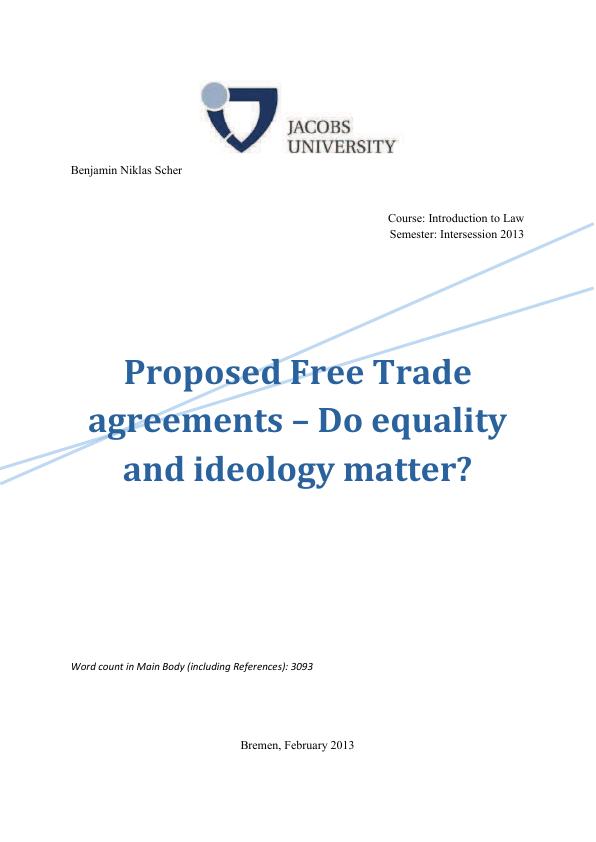The essay discusses recent Free Trade Agreements, that are planned or negotiated. Some examples are put into context according to the economic power of the partners involved. In the end the example of integration by common ideology is introduced with the example of ALBA.
Inhaltsverzeichnis (Table of Contents)
- Introduction
- Proposed FTAs
- FTAs between more equal partners
- FTA between more unequal partners
- Preliminary conclusion
- Integration by common ideology - ALBA
- Bibliography & Further Reading
Zielsetzung und Themenschwerpunkte (Objectives and Key Themes)
This paper examines the potential success of free trade agreements (FTAs), particularly multilateral agreements. The paper analyzes whether the equality of the partners involved and the common ideology they share influence the implementation and success of such agreements.
- The impact of equality among FTA partners on the success of the agreement.
- The role of shared ideology in facilitating the implementation of FTAs.
- The analysis of specific proposed FTAs, including the Transatlantic Free Trade Area (TAFTA) and the Free Trade Area of the Americas (FTAA).
- The examination of the Bolivarian Alliance for the Americas (ALBA) as a model for integration by common ideology.
- The assessment of the potential benefits and challenges of FTAs in promoting economic development and regional cooperation.
Zusammenfassung der Kapitel (Chapter Summaries)
The Introduction lays out the argument for the mutual benefit of free trade based on existing economic theories and focuses on the potential of multilateral FTAs. The paper examines the current landscape of proposed FTAs, differentiating them based on the economic equality of their partners.
The first section delves into FTAs between more equal partners, using the Transatlantic Free Trade Area (TAFTA) as an example. It explores the potential benefits and challenges of this agreement, highlighting factors like existing trade agreements and political disagreements.
The second section focuses on FTAs between more unequal partners, exemplified by the Free Trade Area of the Americas (FTAA). This section analyzes the diverse interests and conflicting priorities of the participating countries, emphasizing the difficulties in achieving consensus.
Schlüsselwörter (Keywords)
This paper explores the relationship between equality, ideology, and free trade agreements, focusing on the role of multilateral agreements in promoting economic development. Key concepts include comparative advantage, specialization, trade liberalization, regional integration, and the impact of economic disparity and ideological differences on the success of such agreements.
Frequently Asked Questions
What is the main focus of this essay on Free Trade Agreements (FTAs)?
The essay discusses recently planned or negotiated FTAs and how the economic power and ideology of the partners influence their success.
What is TAFTA and who are the partners?
TAFTA stands for the Transatlantic Free Trade Area, a proposed agreement between equal partners, namely the USA and the European Union.
What challenges do unequal partners face in FTAs like FTAA?
Unequal partners often have diverse interests and conflicting priorities, making it difficult to reach a consensus on trade liberalization.
What is ALBA and how does it differ from traditional FTAs?
ALBA (Bolivarian Alliance for the Americas) is a model of integration based on common ideology rather than purely economic trade liberalization.
What are the potential benefits of multilateral FTAs?
Multilateral FTAs can promote economic development through specialization, comparative advantage, and regional cooperation.
- Quote paper
- Benjamin Niklas Scher (Author), 2013, Proposed Free Trade Agreements, Munich, GRIN Verlag, https://www.grin.com/document/230014


